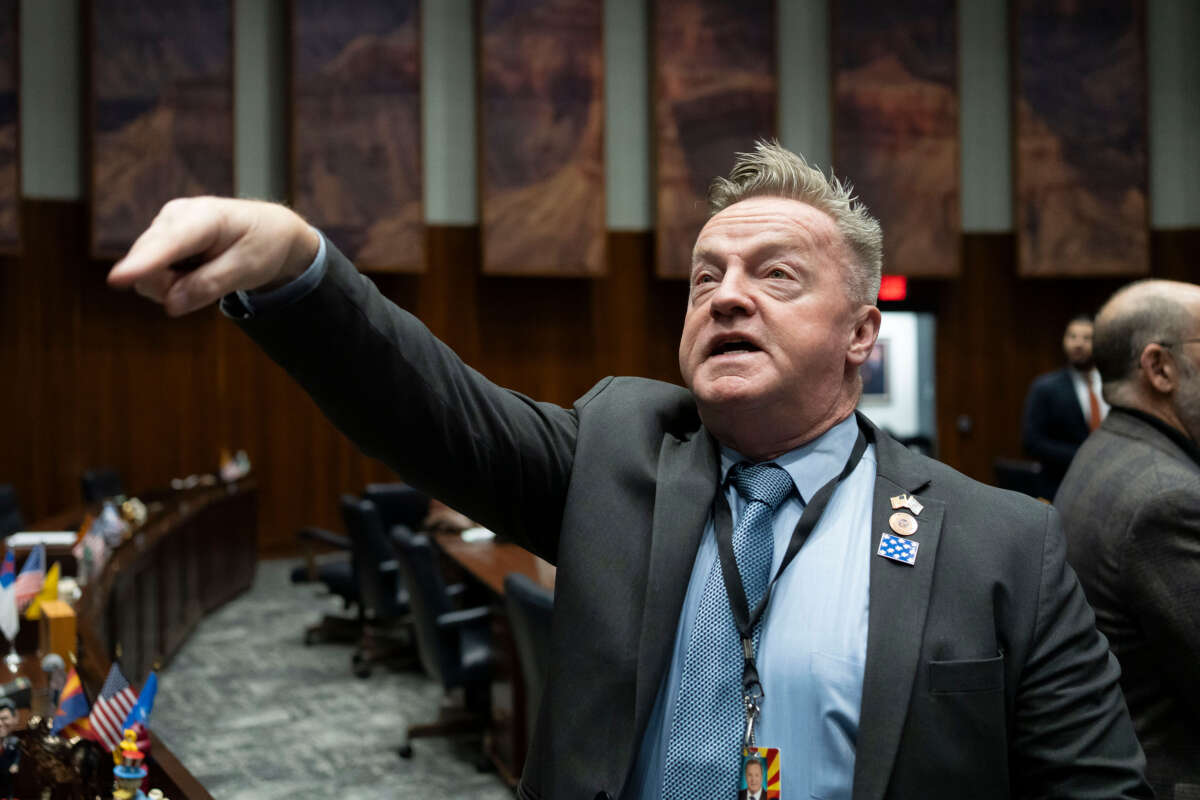A grand jury in Arizona on Wednesday charged seven aides to Donald Trump and nearly a dozen Republican officials over a “fake electors” scheme in the state that aimed to keep the former president in power after his 2020 loss to President Joe Biden.
Trump, who is currently facing nearly 90 charges across four criminal cases as he runs for another White House term, was described as “unindicted co-conspirator 1” in the 58-page indictment, which was announced by Arizona Attorney General Kris Mayes.
“The people of Arizona elected President Biden,” Mayes, a Democrat, said Wednesday. “Unwilling to accept this fact, the defendants charged by the state grand jury allegedly schemed to prevent the lawful transfer of the presidency. Whatever their reasoning was, the plot to violate the law must be answered for.”
The indictment names former Arizona Republican Party Chair Kelli Ward, sitting state Republican Sens. Jake Hoffman and Anthony Kern, former U.S. Senate candidate Jim Lamon, and seven others as the “fake electors” who sought to declare Trump the rightful winner of the state’s presidential contest.
The names of other individuals indicted by the state grand jury are redacted, but the document’s descriptions make clear that former White House Chief of Staff Mark Meadows, former Trump attorney Rudy Giuliani, and top Trump legal strategist Boris Epshteyn are among those facing felony charges — including fraud, forgery, and conspiracy.
“In Arizona, defendants, unindicted coconspirators, and others pressured the three groups of election officials responsible for certifying election results to encourage them to change the election results,” the document reads. “Discussions about using the Republican electors to change the outcome of the election began as early as November 4, 2020. Those plans evolved during November based on memos drafted by [an attorney for the Trump campaign, Kenneth Chesebro].”
Mayes said Wednesday that had the fake elector scheme succeeded, it would have “deprived Arizona’s voters of their right to have their votes counted for their chosen president.”
“It effectively would have made their right to vote meaningless,” said Mayes.
A state grand jury, made up of everyday, regular Arizonans, has handed down felony indictments in the ongoing investigation into the fake elector scheme in Arizona. pic.twitter.com/Nu8GcD4ZqJ
— AZ Attorney General Kris Mayes (@AZAGMayes) April 24, 2024
Alex Gulotta, state director of All Voting Is Local Action Arizona, said Wednesday that “the indictment of the eleven fake electors is one of the first steps required in holding these election deniers accountable for their alleged attempts to take power away from voters by disrupting our free and fair elections.”
“Arizonans deserve to trust the election officials responsible for administering our elections and preserving our democracy,” said Gulotta, “and this is a positive step forward as we continue to strengthen the foundations of our democracy and restore faith in our elections.”
The Arizona Republic reported Wednesday that “several of the Arizona electors have previously claimed they were merely offering Congress a backup plan, though nothing in the documents they sent to Congress and the National Archives backs up that assertion.”
“The indictment includes several statements the false electors made on social media that contradict those claims,” the newspaper observed.
Jenny Guzman, director of Common Cause’s Arizona program, said the indictment “marks the start of a new chapter for the fake elector scheme that has plagued Arizona.”
“Arizonans are still dealing with the fallout from the false electors and the Big Lie about the 2020 elections,” said Guzman. “We are relieved that the investigation by Attorney General Mayes has concluded and Arizonans can now know that what comes next is accountability. These efforts by these fake electors to undermine the will of Arizona’s voters have had implications far beyond their failed attempt to overthrow the 2020 election.”
“This indictment can reassure all Arizonans that if anyone, regardless of their political affiliation, attempts to undermine their vote, consequences will follow,” Guzman added.
Our most important fundraising appeal of the year
December is the most critical time of year for Truthout, because our nonprofit news is funded almost entirely by individual donations from readers like you. So before you navigate away, we ask that you take just a second to support Truthout with a tax-deductible donation.
This year is a little different. We are up against a far-reaching, wide-scale attack on press freedom coming from the Trump administration. 2025 was a year of frightening censorship, news industry corporate consolidation, and worsening financial conditions for progressive nonprofits across the board.
We can only resist Trump’s agenda by cultivating a strong base of support. The right-wing mediasphere is funded comfortably by billionaire owners and venture capitalist philanthropists. At Truthout, we have you.
We’ve set an ambitious target for our year-end campaign — a goal of $125,000 to keep up our fight against authoritarianism in 2026. Please take a meaningful action in this fight: make a one-time or monthly donation to Truthout before December 31. If you have the means, please dig deep.
